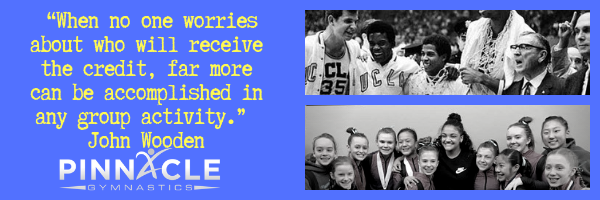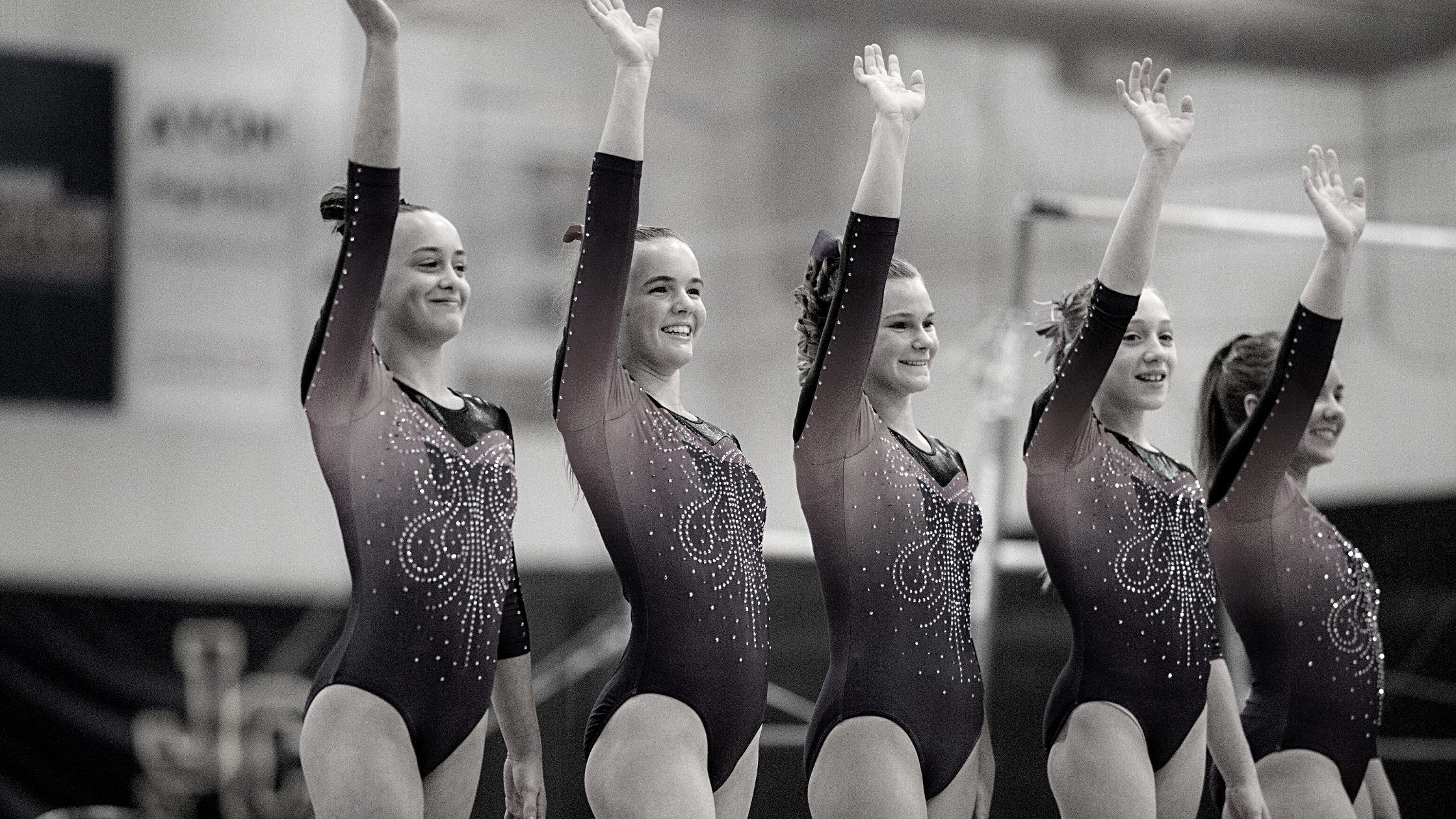Positive Coaching Tips from Coach Wooden
Coach Wooden is considered by many to be the best NCAA basketball coach ever, with an overall record of 664-162. However, more impressive than his wins are the relationships Wooden made with his athletes and the positive impact he had on his players. Wooden is known for teaching more than just basketball. John Wooden taught pillars of character, including: teamwork, hard work, and what it takes to be successful in sports and in life.
Seven Lessons that John Wooden Taught and How they Apply to Coaching Gymnastics
1. Conditioning
“When you improve conditioning a little each day, eventually you have a big improvement in conditioning. Not tomorrow, not the next day, but eventually a big gain is made. Don’t look for the big, quick improvement. Seek the small improvement one day at a time. That’s the only way it happens – and when it happens, it lasts.” - John Wooden
Physical conditioning is a necessary part of sports. It allows the athlete the ability to have the strength and endurance required for an entire game or competition. Mental conditioning is also essential. Mental conditioning is learning to finish even when you are exhausted, learning to be disciplined, and being able to perform under pressure.
As a coach, it is extremely important to maximize your team's opportunities to condition physically and mentally. Coaches, ask yourself these question to look for additional ways to add conditioning to your workouts:
- Can I add one extra pullover to each bar station, or one extra kip cast before each turn?
- Can we add a sprint as a return station on vault?
- What conditioning can go into our warm up?
- When tumbling, can I also work endurance?
- When doing beam complex, how can I incorporate an arm workout?
2. Teamwork
 Teamwork is more than just athletes working together. It applies to coaches and staff putting their ego aside and always working together in the best interest of the athletes and team. Everyone (coaches, parents, athletes, doctors, and teammates) needs to be working toward the same goals. As a coach, be willing to add to your support team in order to benefit the athlete.
Teamwork is more than just athletes working together. It applies to coaches and staff putting their ego aside and always working together in the best interest of the athletes and team. Everyone (coaches, parents, athletes, doctors, and teammates) needs to be working toward the same goals. As a coach, be willing to add to your support team in order to benefit the athlete.
3. Success
“A peace of mind that comes from knowing you did your best." - John Wooden
John Wooden, unlike many others, does not believe that winning is the definition of success. In fact, he believed that there were games that his teams won that he considered to be unsuccessful. He taught his athletes that success is not measured in terms of outcomes. Success is achieved when you have done everything in your control to be the very best version of yourself. Challenge yourself and your athletes to look at each practice and evaluate if you gave your best effort. When this happens daily, most everything else will fall into place.
4. Daily Training
“Daily practice plans are very important. I could tell you what we have done at UCLA each day of practice in all the days I was there. I can look up any practice session and see what we did on that day and also see my notations. I learn from these plans; as a coach, I must change and grow if I expect my players to improve. I can improve with the help of these plans." - From Coach Wooden on Basketball Practice
Make the most of each practice. Coach Wooden was known for planning every minute of his practices. Coming to practice with a detailed plan allows for you to accomplish more in a shorter amount of time. Detailed planning takes time, but it also makes time to work on the details.
5. Enjoyment
“One of my constant reminders was, “End practice on a happy note.” I wanted the boys to want come out to practice, and I wanted them to get a certain amount of pleasure out of basketball. It’s a game. It should be fun." - John Wooden
If you want your athletes to work hard, they need to enjoy it. Help your athletes understand that hard work can be fun. Learning new skills is fun and achieving goals is fun. Make practice fun by providing challenges, working as a team, being enthusiastic, and having a positive attitude.
6. Attention to Detail
.png?width=600&name=%E2%80%9CWhen%20no%20one%20worries%20about%20who%20will%20receive%20the%20credit,%20far%20more%20can%20be%20accomplished%20in%20any%20group%20activity.%E2%80%9D%20(3).png)
If you want your athletes to do something a specific way, it must be taught. Coach Wooden believed that there was no detail too small. In fact, he started his season by teaching his college athletes how to correctly put on their socks and shoes. The same attention-to-detail is crucial in gymnastics. Gymnasts need to be taught how to put on their grips and how to apply chalk. However, they also must learn the details in each skill. The details can be taught by breaking the skill down and learning each piece. In addition to skills, gymnasts need to be taught the details of expected behavior. How should they enter and exit the gym? What should they do when they arrive at an event? How should they respond to corrections? The details make the difference.
7. Care
.png?width=600&name=%E2%80%9CWhen%20no%20one%20worries%20about%20who%20will%20receive%20the%20credit,%20far%20more%20can%20be%20accomplished%20in%20any%20group%20activity.%E2%80%9D%20(4).png)
John Wooden is one of the best examples of positive coaching. His example and legacy is one that all coaches and teachers can look to and learn from. His ability to connect with and build lifetime relationships with his athletes is the ultimate example!





